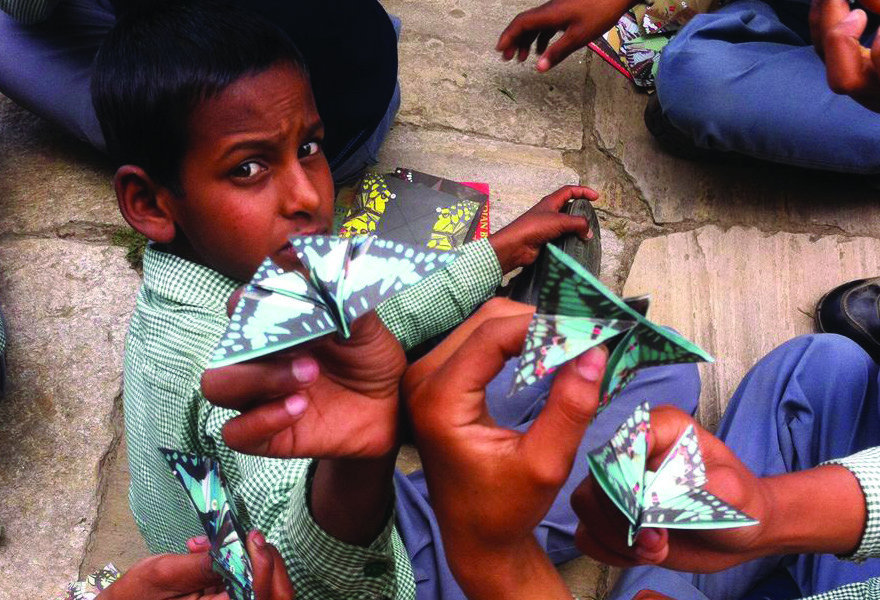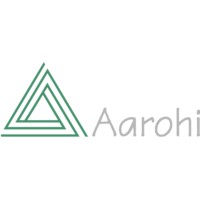By Jyoti Patil | Secretary
BACKGROUND
In 1994 when Aarohi began contemplating its interventions in the field of education, the challenges were many. From inaccessibility, considering a limited number of government schools to which children trekked through mountains covering long distances, to poor enrollment in schools especially of girls, high rate of school dropouts, corporal punishment and the dismal state of infrastructure, the sector abounded with difficulties. What one witnessed amongst the students from these mountain villages was a lack of confidence and poor self-esteem.
In that year’s management committee meeting, it was decided to initiate the education programme with the objective to demonstrate improving the educational environment in rural remote areas of Nainital district through Aarohi facilitated education programme in Ramgarh block.
The aim was to set up a model school that demonstrated the smooth transition from pre-primary to primary education. The challenge was to demonstrate a workable model to reach out to special need children and dropouts in the area and reintegrate them in the mainstream system. The project was conceived after four years of grassroots experience of working in the area. Through an interaction with over 40 villages, then, Aarohi had learned about the needs and aspirations of people.
The dream was to create a space where the children could learn in an environment which would be, as Oona, one of the founders of Aarohi, had scribbled in her diary, “free from fear, fostering curiosity”.
Aarohi Bal Sansar (ABS) is that dream.
Working towards rural development, Aarohi views education as a social equaliser, bringing dignity to human life. Access to quality education, for Aarohi, is a means to attain sustainable development and creating an inclusive, diverse and a compassionate society. The education programme is an extension of Aarohi’s larger vision of creating a more equitable society, by creating development opportunities for Himalayan communities through integrated development.
Aarohi’s Education Programme strives to provide ‘holistic development of personality in a joyful environment’, ensuring every child is nurtured in an environment, which is safe, free, inclusive, empathetic and dynamic. This year we initiated the Education Outreach Programme, to provide crucial mentorship and guidance to Anganwadis (Early Childhood Education Centres) and the local community schools in the state. Through this programme we hope to replicate further, the teaching methodologies evolved from 23 years of our experience of running a school in these parts of the mountains.
SUMMARY
This year, Aarohi Bal Sansar(ABS), a middle-level school, managed by Aarohi, a not-for –profit organisation working towards integrated development in the rural Kumaon hills in the Central Himalayan Region of Uttarakhand, India, completes 23 years of its presence in the region.
January to June is the period leading to the end of the academic session. The entire month of January is a winter vacation, during which children wait in anticipation of snowfall and celebrate with their families the important festival “Ghugutiya”, a festival marking the beginning of the summer solstice.
From February, with the onset of the spring, school begins, the final session of the academic year. It is the time for rigorous studies; preparing for the final exams.
Teacher’s Appraisals are also done in the same period.
This March, ‘Sir’ Taradutta Masa, retired as the principal, ABS, after serving the school for 17 years. The students organised a beautiful farewell programme for him. He nurtured the school for almost two decades.
Monica Shah Drego, joined us as the Education Director from 1st February 2017 and we are all looking forward to some wonderful interventions in the field of education. With thirty long years of experience in the field of Education, Monica Shah, will certainly take ABS to new heights.
We believe, the children learn from their everyday interactions with their environment. Their long walk from home to Aarohi and back also contributes to their education. While most of the students still walk to ‘their school’ ABS, the two taxis we introduced this year has made ABS more accessible to students from many remote villages.
This year we had 25 new admissions from 5 villages, taking the total number of students to 163. We have recruited one new nursery teacher, Renu Kabadwal, who recently completed her nursery teacher’s training programme.
Aarohi Bal Sansar (ABS)
Upholding the vision of holistic personality development in a joyful environment, Aarohi Bal Sansar (ABS), a middle-level school, was started in the year 1994. ABS is a vibrant learning space which is sensitively designed, nurturing children through quality education using the appropriate curriculum, creative teaching methodologies and sufficient infrastructural resources. ABS today is a model public school, providing education which is sensitive to the changing aspirations of the people from these parts.
A strong cadre of competent, empathetic and inspired teachers spearhead the innovative and creative learning process. ABS has 163 students and 22 teachers, learning and growing together.
Student Performance
Considering the students studying at ABS belong to the first generation learners, the major goal of assessment and evaluation is to enable team members to use data to create a profile of a student's strengths and needs.
Children are accessed for cognitive development - the ability to learn new information, speech, understanding of written material; emotional and social development; scientific approach and curiosity and physical development.
A combination of oral and written assessments are done to gauge the child’s improvement on language and comprehension skills. Various co-curricular activities like science workshops; art and crafts workshops; elocution performances are organised to enhance and also to gauge child’s emotional and cognitive development.
Sports and extracurricular activities are systematically organised to instil a sense of teamwork, cooperation and camaraderie. Participation and performance of children in these activities reflect upon their social skills apart from physical development.
We also conduct annual and half yearly written and oral exams to access academic performance.
This year 15 students passed out from ABS, completing primary education up to class 8. This year’s evaluation of academic performance shows high performance of our students from classes 1 to 5 in the subjects Hindi, English and Maths. In classes 6 to 8 however, the struggle continues to improve the academic performance.
With age, the workload of the children at home increases, making it difficult for them concentrate on studies. Considerable students, in these classes, join ABS after finishing their pre-primary schooling in the government schools, which are closer home. With a weak foundation, it becomes difficult for them to cope up with the syllabus in the higher classes.
The major challenges include the gaps in comprehension and correlation. Considerable inputs have gone into innovating teaching and learning methodologies to bridge the learning and comprehension gaps, specific to the children from the region, but there are miles go before we can say we have bridged the gap.
Workshops for Children
Butterfly Workshop, which was conducted by Bheemtaal Foundation, in April, was attended by all the students from grade I to VIII. A short film, explaining the metamorphosis was screened. The children learnt to make butterflies using origami techniques. Cardboard workshop was held in May for students from grade 6 to 8. They were taught to make different articles using cardboard. Akka- Bakka group conducted an art workshop in May. Students were introduced to colours and their creative application.
‘Timeless Life skills’, workshops to expose students to different modes of thinking, were conducted by Atul Pant. Students learnt to construct scientific experiments, varying only one factor at a time to ascertain causation and not just correlation. In ‘Thinking Like an Engineer’ workshops, students were challenged to construct bridges using craft sticks, which were then tested for their load-bearing capacity, introducing to them to the concept of hydraulics.
Teacher’s Training and Capacity Building
As part of annual exposure visit, our teacher visited St.Stephen’s School, Ajmer. They attended one-on-one workshops; sharing their teaching experience with the teachers from St.Stephen’s school. This was an excellent opportunity for them to observe the teaching methodologies followed at St.Stephen’s School. They saw the dessert, which many of them had not seen before. Being from the highlands of Himalayas, this was an enriching exposure for our teachers.
Maths workshop was conducted for the Maths teachers at ABS. They learnt creative and innovative teaching methodologies to teach a difficult subject like Maths, to children from rural areas.
Chandrkala Bisht, our teacher teaching life skills was invited by Astitva Trust in Mumbai, to conduct a workshop on Kumaoni folk dance and music. This boosted her confidence and enhanced her capacity in conducting workshops for large groups.
Sports and Co- Curricular Activities
ABS playground is the pride of its students. Children are provided ample opportunities to groom their talents in sports. Children in the mountains exude an innate ability in sport and the outdoor, hence it has been a continuous endeavour of the school to nurture this potential and groom them for Block and State-level competitions. ABS has a full-time sports teacher who trains students in various games like Kabaddi, Kho Kho and athletics. Volunteers also join in to teach football, volleyball and cycling.
This year ABS students participated in a Kabaddi, Kho Kho and Athletics competition held at the block level. They secured first place at the primary and Junior level. At the Block level, students participated in Kabaddi and Kho kho, standing first in all the games. At the district level, Paras Dauthar and Harshit Bisht and Vivek Kumar of class 5, were selected for Kho Kho. Preeti Thapa stood first in long jump and second in 400 meter race. She has been selected for the State-level competition. Ishika Rani and Preeti Thapa were also selected for Kabaddi at the State level. Neha Negi of class 7, and Shobha Arya and Kalpana Bisht of class 8 were selected for State level. Sakshi Arya of class 6 was selected for Kho Kho. At Junior level, boys stood second in Kabaddi, where Abhishek Bisht and Yogesh Bisht were selected for the State level competition.
Class 4,5, 6, 7 and 8 students participated in a State level drawing competition held by the Education Department.The topic was ‘Energy Conservation’. To promote greater awareness of their cultural heritage, an ‘Aipan’ drawing competition was held at ABS for the students of class 6 and 8. Children were explained the art form, its motifs and significance of each of the motif. A drawing competition on the topics energy conservation, save environment and clean India, was held on the occasion of Children’s Day, at ABS.
By Jyoti Patil | Secretary, Aarohi
By Neeraja Joshi | Secretary
Project reports on GlobalGiving are posted directly to globalgiving.org by Project Leaders as they are completed, generally every 3-4 months. To protect the integrity of these documents, GlobalGiving does not alter them; therefore you may find some language or formatting issues.
If you donate to this project or have donated to this project, you can receive an email when this project posts a report. You can also subscribe for reports without donating.


